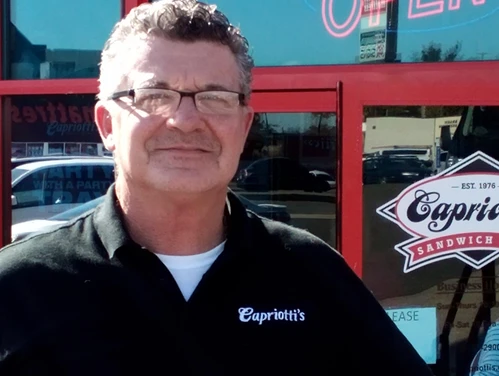The last time they locked Raymond Miller up, he realized it was time for a change.
By then, Miller had spent roughly eight years self-medicating his mental health issues with a mix of methamphetamine and cocaine. Fueled by addiction, the former successful automobile salesman had “slid into darkness,” leading to a succession of charges that included theft, forgery, and unauthorized use of a car. “For roughly five years there, I was in the Linn County Jail more often than I was out.”
After one final probation violation, Miller says he embraced religion and discovered a new attitude. And then, he decided to act.
“Everything started my last time in jail,” he said. “I realized that one of my issues in the past was I didn’t have a plan… Sometimes, they let you out, and you realize that all know is the wrong people.”
So, when time came for Miller’s release last June, he erased his cell phone contacts and went to IowaWORKS.
Five months later, this three-time felon is now general manager of a franchise Cedar Rapids sandwich shop – and an active participant in helping formerly incarcerated Iowans make the same turnaround that he made.
“He was up front with saying that he was intimidated” about the job search, said Steven Lerch, a career planner at the Cedar Rapids IowaWORKS office who specializes in helping people who have a history in the justice system. “One of the key challenges with this population is understanding that there are certain prejudices in society. It’s about educating employers that you can be a likely candidate.”
Miller attended the IowaWORKS Career Accelerator Workshop, where he learned the importance of soft skills and having an updated, professional resume. Then, he came back for additional assistance.
Lerch and Career Planner Natalie Fraehlich encouraged Miller to trumpet his management experience and to not be shy about discussing his talents. Only then, the IowaWORKS team urged, should Miller recount his criminal history, provide context, and mention the availability of programs like the Work Opportunity Tax Credit and the Federal Bonding Program – programs that provide tax incentives and free insurance against employee theft for companies who hire individuals with barriers to employment.
“These are great programs that have been around since 1966, but not that many people are aware of them,” Lerch said. “One of the best ways to educate them, I’ve found, is through the job candidates themselves.”
For Miller, the approach paid off.
“I came in thinking I was just going to get a part-time job to get the ball rolling,” Miller said of his interview at Capriotti’s Sandwich Shop. “Then, the owner looks at my resume and says, ‘This is ridiculous. Why aren’t you applying for a management position?’ ”
One month later, he was running the store – and working closely with Lerch to hire other people who share Miller’s background.
Shelley Seitz, reentry operations manager at IowaWORKS, estimates that Iowa currently has roughly 8,000 people incarcerated, most of whom will eventually be released. (That doesn’t include another 41,000 or so who are currently on community supervision.) The IowaWORKS Reentry Team, which includes six reentry career planners based inside prison walls, works with roughly 2,000 people per year to help them prepare for finding work upon release. The Cedar Rapids IowaWORKS team, which is part of Iowa’s recent effort to train more Offender Workforce Development Specialists (OWDS), helped a total of 89 justice-involved individuals find work in the first year after team members obtained their certification.
Seitz said Iowa has trained more than 30 people over the last three years to better understand what steps need to be taken to help justice-involved individuals succeed in the workplace.
“Helping them find jobs can increase public safety and lower recidivism,” Seitz said. “It all works better if we can keep people out of prison, employed for themselves, and not committing crime.”
Miller said he’s already found successful employees by hiring some of the people referred by Lerch: “They have the best work ethic out of anybody, because they know they’ve got a lot to prove, and they’re thankful for the opportunity.”
He includes himself on that list of the grateful.
“I’m just not going to look back,” Miller said. “I’m loving life every single day.”
For more information about programs to help justice system-involved individuals find careers, visit IWD’s Returning Citizen Initiative webpage.
